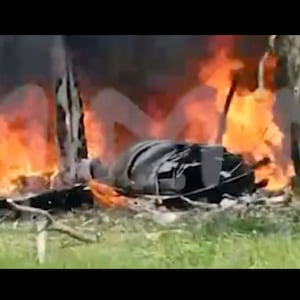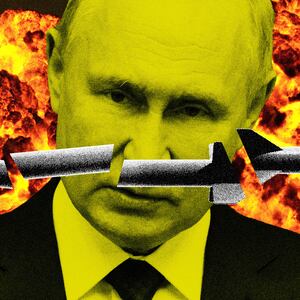The following is excerpted from a new afterword to the paperback edition of Lessons from the Edge, the bestselling memoir by former U.S. Ambassador to Ukraine Marie Yovanovitch—a pioneering diplomat who spent her career advancing democracy in the post-Soviet world. Yovanovitch penned this afterword on Russia’s war in Ukraine in the fall of 2022 and continues to speak publicly about the latest developments.
Russian Psyops Against the West
As Russia’s war on the Ukrainian people continues, so do its efforts to deter the West from providing support to Ukraine. Russia has doubled down on its psychological operations by repeatedly floating the idea that it might deploy tactical nuclear weapons if “its” lands are threatened. This scenario seems unlikely, since such strikes would not necessarily make a difference on the battlefield and would probably even further isolate Russia internationally. But we also need to keep in mind that our logic is not Putin’s logic, as demonstrated by his large-scale invasion of Ukraine, and that one can never rule out the crazy or the purely evil when talking about him.
At this point, Putin must know that the Ukrainians will keep on fighting, since the Ukrainians understand that if they stop, Russia will kill them anyway. But Putin is counting on the fact that he can scare the West into backing down in the face of the nuclear threat. That, out of concern for the nuclear—and potential political—fallout, we would pressure Ukraine to concede, taper off our support for the military, and become less unified as our sense of purpose frays.
The Biden administration is taking the right approach in remaining steadfast in its support of Ukraine and warning Russia, publicly and privately, that use of a nuclear weapon would be “catastrophic” for Russia. This is not the time to lose our nerve.
It is naive to believe that if we give in to nuclear blackmail, Putin will back off. If Russia gets its way with Ukraine following such threats, Russia will not stop. Russia will keep on going and will deploy nuclear threats in the hope of securing further concessions. Other nuclear countries will take note, and non-nuclear countries will rush to get a nuclear weapon so that their sovereignty won’t be threatened. In short, if we give in to Putin’s threats, we will be living with nuclear threats and nuclear proliferation for a very long time.
In addition to scaring us with nuclear threats, Russia is weaponizing energy and food commodities, hoping to divide the world community over the scarcity of resources. As Europe, including Ukraine, faces a cold winter, the specter of famine rises in the global south. We still don’t know all the secondary and tertiary effects of Putin’s war of choice. All over the world, it seems that tensions are higher, and our resolve is being tested. Other former Soviet republics, now independent countries, may be tempted to settle old scores left unresolved after the 1991 dissolution of the USSR. Having opened Pandora’s box, it is not clear whether Putin will be able to manage what emerges, including in the Russian Federation itself.

A view shows a site of a warehouse burning after a Russian missile strike, amid Russia's attack on Ukraine, in Ternopil, Ukraine in this handout picture released May 14, 2023.
Press service of the State Emergency Service of Ukraine in Ternopol region/Handout via REUTERSWhile no one has a crystal ball, it appears, as of this writing, that Russia and Ukraine are going to be locked in combat for some time. The war will get even uglier, and many more lives will be lost. The Ukrainian people will continue to suffer as Russia doubles down on its war of terror. Europe and other parts of the world will also pay a price.
But the war will end, as all wars do. While it’s not clear what conditions Moscow would accept, Russia is not in a position to dictate terms, and most military experts believe it can’t improve its position on the ground. That’s why it is dangling the nuclear and energy threat over the West, hoping that the West will push Ukraine into concessions.
Ukraine’s Goals
For its part, Ukraine—and Ukrainians—are rightly wary of being forced to make unsustainable compromises. In 2014 and 2015, France and Germany in essence helped Russia secure two agreements with Ukraine that would, at best, create frozen conflicts in the east of the country. Likewise, the sanctions the West had imposed in the hope that they would force Russia to bring an end to the conflict were insufficiently broad and painful to make Russia change its behavior. Russia continued the war in the east until Putin judged the time was right to launch a large-scale invasion in 2022.
This precedent is not lost on Ukraine. Russia needs to pay a price for its aggression against Ukraine that is sufficiently costly, and therefore instructive. And Ukraine needs sufficient security guarantees from the West to feel confident that agreeing to a peace settlement won’t just allow Russia to regroup, rearm, and reattack when the West has lost focus.
Unlike Russia, Ukraine is a democracy and the Ukrainian people will have a say in whatever the war’s outcome might be. After Bucha, public opinion turned from generally supporting negotiations with Russia to
seeking victory; anything less, they felt, would reward and embolden Russia, make a lasting peace impossible, and disrespect the memory of those slain and tortured. Those feelings have only grown with every new atrocity and inhumanity Russia has visited upon Ukraine. An October 2022 public opinion poll indicated that more than 80 percent of the Ukrainian public supported continuing the war. Ukraine is winning and wants to keep on pressing Russia so that Ukraine can leverage a position of strength on the battlefield into negotiating success.
This success would include sovereignty over Ukraine’s internationally recognized borders, including Crimea; security guarantees from the West; accountability for war crimes; and reparations from Russia. Importantly, accountability would serve as a deterrent to those, not just Russians, who might consider participating in war crimes in the future. They need to understand that if they choose to take this course, the world will not allow them to do so with impunity.
The West will play an important role in the endgame, but we need to be careful that as we seek to “help,” we don’t offer compromises and supposed “off-ramps” that Russia pockets without living up to its own obligations as has so often been the case in the past. We need to ensure that when we seek to be constructive, Putin sees a strong power to be reckoned with, not a weak country to be taken advantage of. Russia’s modus has often been to create problems and then watch as others fall all over themselves trying to fix them. In our zeal for peace, we can’t forget that it is Russia that invaded, and that we won’t have a lasting peace until Russia recognizes this and becomes a part of the solution.
The U.S. Stake
President Biden has articulated the principled position that it is up to the Ukrainians to decide when they are ready for negotiations. That’s right, but we also need to acknowledge that we have a stake in this war too, not least because Putin is fighting us in Ukraine as well.
This isn’t just a war about Ukraine, it is about what kind of a world we are going to be living in after the war is over. Are we going to live in a world where Ukraine prevailed, and the principles of the rules-based, democracy-driven international global order are observed? Or will we be living in a Hobbesian, might-makes-right world where authoritarianism prevails, where Russia disappeared a country of more than forty million people in the geographic center of Europe and Putin makes the rules? Even if one doesn’t care about the freedom of others, imagine what that kind of world would do to our commercial interests and supply chains around the globe, to our smaller democratic partners in far-flung places, and to our own security.

Joe Biden meets with Volodymyr Zelensky in the Oval Office of the White House, on September 1, 2021, in Washington, DC.
BRENDAN SMIALOWSKI/AFP via GettyThat’s why we need to ensure that Putin does not prevail. Ukraine is fighting and Ukrainians are dying—for all of us. This is why we need to keep on providing the military, economic, humanitarian, and political assistance to ensure success. It is far better that Russia be stopped in Ukraine than succeed in Ukraine and continue its aggression further. There is no doubt that it is the right thing to do to support the Ukrainian people against Russia’s war of aggression. We are a nation of values, and this is fully in keeping with our values. It is also the smart thing to do, as it is so clearly in our national security interests.
We have had a bipartisan consensus to support Ukraine since its independence in 1991, including during this greatest challenge to the very existence of the country and its people. That must continue. If we shrink from upholding our principles and supporting Ukraine now, we will have to confront Russia later, quite possibly farther west, and at a time not of our choosing or in a place not to our advantage.
Putin’s actions over the past decade have made clear that we ignore Russia at our peril, and that Russia will become even more dangerous as the country continues to spiral downward. There are many who believe that China poses the larger long-term risk to our security, and that may well be true. But the best way to deal with China is through Ukraine. If Ukraine emerges victorious, China (and others) will take note. And, at least to date, China has done nowhere near the damage Putin’s Russia has already done to the United States. Russia has sowed greater chaos in the world, upending oil markets, assassinating alleged foes in sovereign countries, and profoundly—but I hope not irrevocably—infusing our domestic politics with disinformation and distrust.
Russia has unleashed greater harm on American and world security over the past ten years than any other country. We need to deal decisively with Russia, or we will continue to be held hostage to nuclear threats, food insecurity, economic sabotage, and energy crises, not to mention the by-now traditional means by which Russia undermines the U.S. and the international order: disinformation, cyber-attacks, assassinations, and good old-fashioned kinetic warfare.
I remain confident that the Western community of nations, including Ukraine, can manage this crisis that Russia is fomenting. But it will not be quick or easy, and we will be constantly tested in ways both predictable and not. Russia has set the stage for a cold, dark winter in 2023. This edition of Lessons from the Edge will be published as winter is nearing an end, and readers will be able to decide for themselves how Ukraine, the U.S., and the European Union have navigated this latest test: the weaponization of winter.
So far, we have succeeded because we have taken a strong, steadfast, and united approach. Despite the significant headwinds, we need to stay the course. I know the Ukrainians will, because their security and very existence is at stake. Our security is at stake too, although perhaps not as visibly—or immediately. It is, therefore, imperative for our own sake that the U.S. and the West display the same determination the Ukrainians do.
We also need to look further into the future and help Ukraine in building a just and lasting peace. The reconstruction of Ukraine, the reform of international institutions, the calibration of policies toward post-Putin Russia, all these tasks will be the work of at least a generation. It will be the test of our times and the yardstick against which we will be judged by those who come after us. The challenges are many, but we have triumphed in more difficult times. And we must now do so again.








